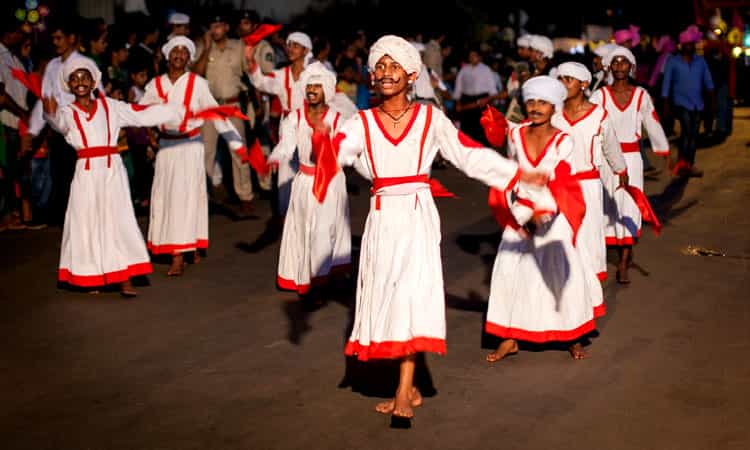
Goa, often celebrated for its sun-kissed beaches and lively nightlife, also holds a treasure trove of cultural richness. At the heart of this vibrant heritage are its traditional dance forms, which serve as living expressions of its history, values, and identity. Rooted in the state’s tribal origins, Indian traditions, and Portuguese influence, these dances transcend mere entertainment. They narrate stories of devotion, agriculture, and everyday life, providing a deeper understanding of Goa’s diverse heritage. Whether performed during festive celebrations or cultural events, each dance reflects the enduring spirit of Goa and its people.
Fugdi: Celebrating Unity and Simplicity
Fugdi, performed mainly by women, is a rhythmic dance rooted in Goa’s villages. It is usually performed during Ganesh Chaturthi and other festivities. The dancers form circles or rows, clapping their hands and swaying in sync. The simplicity of Fugdi represents the communal harmony of Goa’s agrarian past. This is one the most famous Goa’s traditional dances.
Dekhni: Fusion of Cultures
Dekhni, a semi-classical dance, beautifully blends Indian and Portuguese influences. The dance narrates stories, often involving a young woman’s journey or aspirations. Accompanied by Konkani songs, it captures the blend of local and colonial elements in Goan culture.
Goff: A Harvest Celebration
Goff is a traditional folk dance performed during the Shigmo festival, celebrating the harvest. Dancers skillfully weave and unwind colorful ribbons tied to a central pole, symbolizing unity and agricultural prosperity. It reflects the importance of farming in Goa’s history.
Dhalo: A Tribute to Nature
Women perform Dhalo, another women-centric dance, over five nights during the lunar calendar. It involves singing and dancing around a sacred space, often invoking blessings for fertility and prosperity. This dance highlights the deep connection between Goans and nature.
Corridinho: A Portuguese Legacy
Corridinho is a lively dance introduced during Portuguese rule. Couples perform intricate steps to cheerful music, showcasing Goa’s colonial history and its enduring cultural influence. This dance remains a popular feature at festivals and weddings.
These traditional dances not only entertain but also preserve Goa’s rich history, blending indigenous, Indian, and Portuguese cultures into a unique heritage. Visitors to Goa can experience these performances during local festivals, offering a glimpse into the state’s vibrant cultural tapestry.

